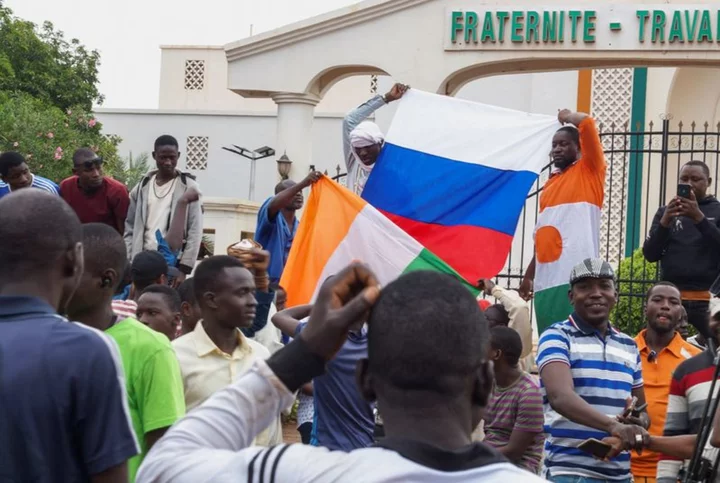By Daphne Psaledakis and Simon Lewis
WASHINGTON Soldiers in Niger declared a military coup on Wednesday, overthrowing President Mohamed Bazoum. The landlocked nation, a key U.S. ally in the region, has received millions in assistance from Washington.
Here are answers to questions about U.S.-Niger ties:
WHY IS NIGER IMPORTANT TO THE UNITED STATES?
The country, located in the semi-arid Sahel region, plays an outsized role in the United States' Africa strategy. Most importantly, it is a key partner for Washington's fight against Islamist insurgents who have killed thousands of people and displaced millions more. U.S. military personnel have been training local forces to fight militant groups.
The Biden administration has also held up Niger as a democratic success story in a region that has faced a series of coups or attempted power grabs over the past three years.
Bazoum's ouster threatens both priorities.
WHAT ARE THE MILITARY TIES BETWEEN THE US AND NIGER?
Niger and its neighbors Mali, Burkina Faso, Nigeria and Chad are all struggling to repel Islamist insurgents.
Groups linked to al Qaeda and Islamic State have carried out dozens of attacks in southwestern Niger, including some that have killed dozens of Nigerien soldiers, but the violence has not spread across the whole country as it has done elsewhere.
"Niger has been an incredible security partner on the continent, and so we will continue to pay close attention to this," State Department deputy spokesperson Vedant Patel told reporters on Thursday.
There are about 1,100 U.S. troops in Niger, where the U.S. military operates out of two bases.
In 2017, the government of Niger approved the use of armed American drones from the country to target militants.
WHY HAS WASHINGTON PRAISED DEMOCRACY IN NIGER?
While violence in Mali and Burkina Faso led to military coups and a shift in alliances away from Western nations and towards Russia, Niger managed a democratic transfer of power in 2021 and has kept smooth relations with the West.
The State Department in March said Niger had "taken important steps to consolidate and strengthen its democracy."
A State Department official in March also praised Bazoum for speaking out against Russia's private Wagner group of mercenaries, which has been hired by Mali's junta to help fight insurgents there. Mali describes the Wagner personnel on its territory as trainers.
Patel said on Thursday he was not aware of any indication that the Wagner force could be involved in the overthrow of Bazoum, but said the situation continues to be quite fluid.
WHAT ASSISTANCE DOES THE US PROVIDE TO NIGER?
U.S. Secretary of State Antony Blinken announced $150 million in new humanitarian aid for Africa's Sahel region in a visit to Niger in March, the first visit by a U.S. Secretary of State.
The State Department in March said the United States had plans to provide $101 million in bilateral assistance to Niger in fiscal year 2022, including assistance for food security, democracy and governance, and security.
The U.S. also provided nearly $135.4 million in bilateral humanitarian assistance in fiscal year 2022, the State Department said.
It is unclear how much the United States has given in security assistance specifically. The U.S. Embassy in Niamey in 2021 said the Pentagon and State Department had provided Niger more than $500 million in equipment and training since 2012.
HOW WOULD BAZOUM'S OUSTER AFFECT U.S. AID?
U.S. law on foreign aid prohibits most assistance to any country where the elected head of government has been deposed in a coup d'etat or by decree, unless the Secretary of State determines that providing aid is in the national security interest of the United States.
Members of Congress who run the appropriations subcommittees responsible for foreign aid said on Thursday they were watching the situation closely.
"I think the State Department first has to reach the conclusion that the new junta has taken power in a coup," said Democratic Senator Chris Coons, who chairs the Senate subcommittee.
"Let's not get ahead of ourselves. If that's what happened, we will cut off assistance, consistent with U.S. policy."
Republican Representative Mario Diaz-Balart, who chairs the House subcommittee, said he was monitoring the developments.
(Reporting by Daphne Psaledakis, Simon Lewis, Patricia Zengerle, Moira Warburton, Phil Stewart and Idrees Ali; Editing by Don Durfee and Daniel Wallis)

